Liberal Arts vs Fine Arts Degrees
What Can I do With a Liberal Arts Degree?

Find your perfect value college

There is a lot of talk about how STEM-related degrees are where the money is, but don’t underestimate the value of a liberal arts degree. At the undergraduate level it provides a well-rounded, solid education that can be transferred to a wide variety of careers, including:
- business
- law
- social work, and more.
Society will always need good:
Featured Programs
- communicators
- researchers
- critical thinkers
A general humanities degree will provide those timeless skills.
There is a lot of debate about liberal arts degrees. Some say they are useless. Others feel that the skills taught in a liberal arts program can be applied to a wide range of subjects. This makes it a versatile degree that can help in a wide variety of careers. In this guide, you will learn:
- the pros and cons of a liberal arts education
- what it can be used for
- whether it is the right degree for you.
What are the Benefits of a Liberal Arts Education?
A liberal arts degree provides students with a well-rounded, multidisciplinary foundation that covers basic human experience. Some of the benefits of a liberal arts education are:
- stronger interpersonal skills
- critical thinking
- leadership skills
- the ability to work well in a team setting
- personal fulfillment
So what is a liberal arts degree good for? It opens the door to many career options, including:
- advertising account executive
- anchorperson, archivist
- city manager
- college recruiter
- copywriter
- creative writer
- customer service representative
- editor
- grant writer
- journalist
- lobbyist
- museum manager
- policy analyst
- politician
- publicist
- urban planner
Is a Liberal Arts Degree Useless?
The biggest argument against a liberal arts education is that it doesn’t prepare students for a specific career. That is true. However, that doesn’t make a liberal arts degree useless.
Ob the contrary, it’s very useful.
According to a 2020 report by the Association of American Colleges & Universities titled Fulfilling the American Dream: Liberal Education and the Future of Work, employers place a great deal of value on many of the “soft skills” that a liberal education provides. At least 75% of hiring managers value:
- oral communication
- teamwork skills
- critical thinking and reasoning skills
- information literacy
- written communication
- complex problem-solving skills
These are skills provided by a liberal arts education.
To improve their employability, liberal arts students should make a special effort to complete internships during college to make up for the lack of specific job skills in the degree program. 94% of hiring managers say they are more likely to hire a recent graduate who has completed an internship or apprenticeship.
Community colleges can often help preparing students by letting them get their liberal arts requirements out of the way cheaply.
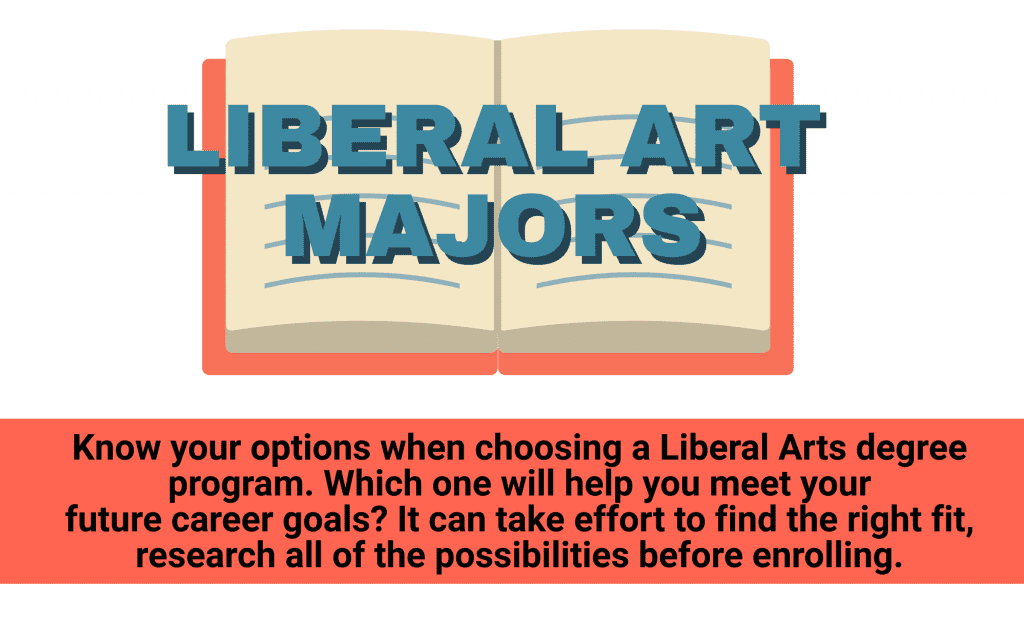
Is a Liberal Arts Education Still Relevant Today?
The Harvard Business Review published an article reiterating the importance of liberal arts education in the 21st century. According to the article, the demand for liberal arts graduates is growing. Why? Liberal arts education provides students with the skills they need to rapidly respond to changing conditions in the workplace.
What are the Liberal Arts and Sciences?
A degree in the liberal arts and humanities covers a broad range of subjects. Students learn the basics of many different fields rather than focusing on one specific career path. A liberal arts and sciences curriculum typically includes courses from:
- humanities and social sciences
- physical and biological sciences
- the arts
Courses that are often found in a liberal arts program include:
- Writing
- literature
- sociology
- ethics
- history
- philosophy
- fine arts
What is a Liberal Arts College?
A liberal arts college doesn’t focus on one particular area of study. It develops a well-rounded student through a broad educational base combined with personal development. Students in liberal arts programs develop communication and critical thinking skills. They learn how to get along with one another and work together. They learn to argue effectively and solve problems. They learn to relate with one another through empathy and openness. They also develop skills such as analytic thinking and reading comprehension.
Some liberal arts colleges have traditional programs that consist of a set curriculum. Many allow students a great deal of flexibility in designing their own programs. Others fall somewhere in the middle, offering students the ability to individualize a part of the program. This allows them to pursue their own interests.
Liberal Arts vs STEM
Although at first glance, the two may seem incompatible, it doesn’t have to be liberal arts vs STEM. This is one case where you really can have your cake and eat it too. USA Today published an article explaining how your “useless” liberal arts degree can help you get ahead in tech. It turns out that tech companies are looking for skills like:
- the ability to solve challenging programs
- willingness to learn new things
- leadership skills.
And if it turns out that you do need job-specific credentials, a liberal arts degree combined with a tech graduate degree or industry-specific credentials such as Microsoft certification could be the perfect solution.
Liberal Studies vs Liberal Arts
The terms “liberal studies” and “liberal arts” seem to be used interchangeably in most cases. Both indicate a multidisciplinary degree that focuses on skills such as problem-solving and critical thinking. However, some schools choose to use the term “liberal studies” instead of “liberal arts.”
Fine Arts vs Liberal Arts
Fine arts are the creative arts or visual arts, such as:
- drawing
- painting
- sculpture
Drama and music are also considered fine arts. A liberal arts degree often includes one or more fine arts courses. However, it is not the same as a fine arts degree, which is an in-depth program of study focusing on a specific fine art, such as:
- music
- theater
- dance
- studio art
Why Liberal Arts Education Matters
Why do liberal arts education matter? For one thing, no matter how advanced technology gets, critical thinking skills will never go out of style. And liberal arts majors are often able to adapt to changes more quickly than their peers who studied one subject more intensively. Liberal arts majors have an edge when the workplace—or technology—changes. After all, liberal arts and humanities is by definition a very adaptable degree.
Liberal arts courses do not appeal to everyone, and that difference in personality is another thing worth noting. Not everyone is destined to be a great engineer. Engineering—and other tech careers—attract people with the aptitude and personality to do well in them. The type of people who are attracted to liberal arts degrees might not make good engineers. But they still do very well compared to people with similar personalities who choose to get no degree at all.
Types of Accreditation for Liberal Arts Colleges and Universities
There are two main types of accreditation to look for when choosing a college—regional and national. Regional accreditation applies to the entire school. The United States is divided into six regions, each of which are handled by a different accreditation body. The six accrediting agencies are:
- the MSA (Middle States)
- NASC (Northwest)
- NCA (North Central)
- NEASC (New England)
- SACS (Southern)
- WASC (Western)
All of these are respected accrediting bodies. The courses from colleges they accredit are generally transferrable.
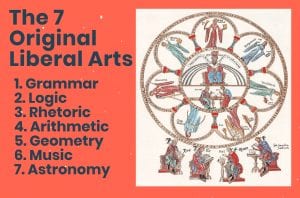
In addition to regional accreditation, program-level accreditation is available for liberal arts colleges from the American Academy for Liberal Education (AALE). AALE seeks to ensure the quality of liberal arts education by recognizing schools and programs that meet certain standards.
Degree Program Types
An associate degree (AA/AS) in the liberal arts is generally intended to prepare students planning on transferring to 4-year programs. Two-year programs will consist of a core area of study, the fundamentals that students get in the first two years of a traditional university.
(Check out: What is the Benefit of Going to a Community College?)
Bachelor’s degree (BA/BS) students can expect to major in a variety of subjects such as:
- English
- mathematics
- psychology
- history
- philosophy
- religion
Students will take the specialized, upper-division courses that prepare them for professional work in their chosen field. Or they can pursue graduate study.
Graduate school is where students go for the higher credentials (MA/MS/MLS). There are many reasons students go on to graduate study:
- to earn a higher salary and status in their careers
- to become experts in a more specialized, competitive field
- to prepare to teach at a secondary or college level.
Students at the graduate level are expected to be more self-motivated, driven, and committed than in undergraduate. Graduate study is usually much more demanding and challenging. Most master’s degree programs are 2-3 years of full-time work, though accelerated online degrees may be only one year.
The highest degree for the liberal arts is usually the Doctor of Philosophy (PhD). The traditional name can be confusing, as it is applied across disciplines, not just for the philosophy major. The PhD is mainly desirable for those who want to teach and do research. It is usually the standard for employment as a professor at a university or college. However, a graduate with a master’s degree can work as a part-time instructor. It is the most specialized and most challenging liberal arts degree. It can take anywhere from 3 to 7 years of post-undergraduate work to complete.
(Check out: What’s the ROI of a College Degree?)
In addition to regular liberal arts majors, there are other degrees that are typically considered to be liberal arts majors. For example, psychology is a liberal art. At the bachelor’s level, a psychology degree typically provides a broad base of knowledge. It does not prepare students for a specific career. If a student wants to become a psychologist, doctoral-level education is required.
So what determines whether a degree is a liberal arts degree? By definition, it is a multidisciplinary degree program. It focuses more on the development of the student than on preparation for a job or career. Consider the liberal arts degrees on this list:
- American studies
- classics
- history
- humanities
- sociology
- English literature
- philosophy
- social science
- religious studies
- art history
None of these teach hard job skills. Instead, they teach students how to think and communicate more clearly.
Best Value Residential Rankings
Top 50 Best Value Undergraduate Schools
Top 50 Best Value Graduate Schools
What are the Best Liberal Arts Majors?
Kiplinger recently published a report on the best and worst liberal arts majors for your career. They evaluated several liberal arts degrees based on salary and the expected job growth outlook. The three best liberal arts majors on their list are:
- American studies (mid-career salary $83,400)
- classics (mid-career salary $85,400)
- philosophy (mid-career salary $86,000)
The worst are:
- foreign languages
- linguistics
- religious studies
- art history
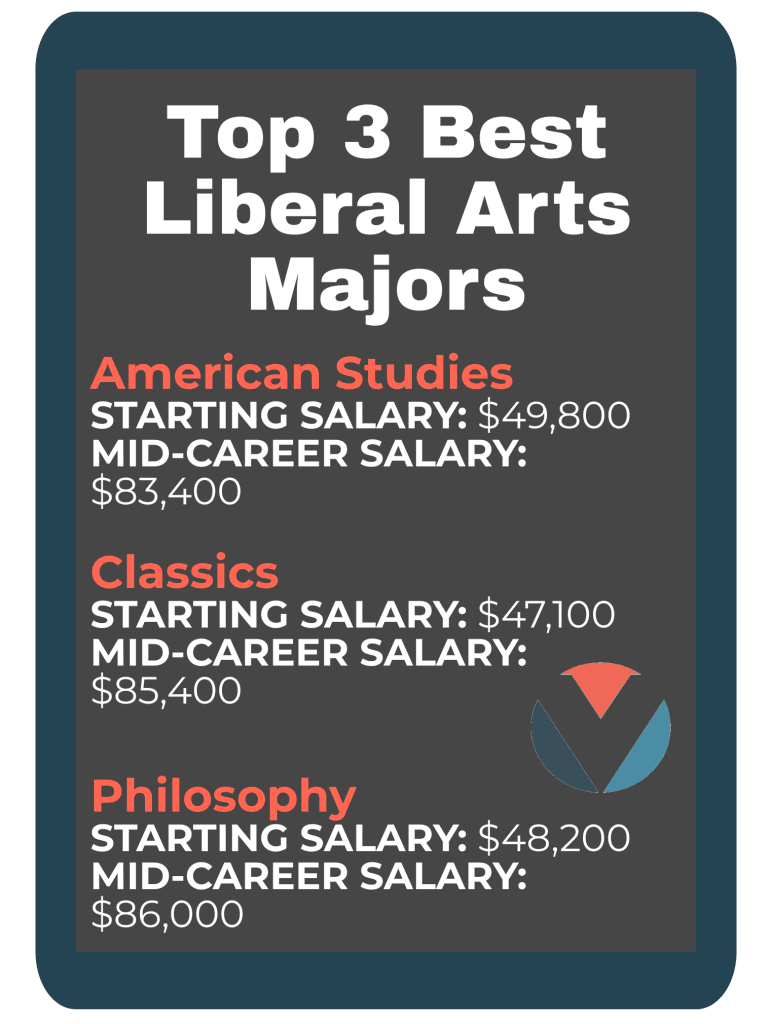
Liberal Arts Graduate Programs
There are a variety of liberal arts graduate programs at the master’s level, but there are not too many general liberal doctoral programs. Most students opt for a doctoral degree in a specific liberal art rather than getting a liberal arts PhD degree. The PhD is best suited for students who are sure they want to teach as college professors. However, these students should consider having a backup plan. The Bureau of Labor Statistics projects 11% growth in employment for postsecondary teachers. However, most of those jobs are expected to be part-time positions.
The best master’s degree for liberal arts majors is usually something other than liberal arts. A bachelor’s degree in liberal arts provides a strong foundation. The right master’s degree can provide \skills that can be immediately applied in a new job or career.
Some master’s programs can be completed regardless of what type of bachelor’s degree the student holds. These are good choices for liberal arts graduates. For example, master’s degrees that don’t require a related bachelor’s include:
- business administration
- clinical mental health counseling
- cybersecurity
- education
- English
- forensic psychology
- health care management
- information technology
- interior design
- physical therapy
Liberal Arts vs Business Degree
Are you trying to choose between a liberal arts degree and a business degree? It doesn’t have to be one or the other. Why not get both? There are several ways students can prepare for a business career while studying liberal arts. One option is to choose a BA in business administration over a BS. The BA degree typically includes more humanities and other courses that are considered part of a liberal arts curriculum.
Another option is to choose a liberal arts college. Liberal arts schools usually offer a more holistic approach to traditionally scientific or career-oriented degrees. Students can also complete a bachelor’s in liberal arts and follow it up with an MBA.
Combining a liberal arts education with business offers the best of both worlds. You learn important human skills such as critical thinking and collaboration but also gain the practical skills needed to succeed in the business world.
Online Liberal Arts Degrees
There are dozens of bachelor’s level liberal arts programs available online. There are also liberal arts graduate programs. These programs are knowledge-based and don’t require any hands-on training. It is often possible to complete the program 100% online. Online programs are a good choice for adult students with busy lives. The flexibility of an online liberal arts program enables students to fit their classes around their work schedules and other commitments.
Online liberal arts degree requirements are typically the same as for the school’s campus-based program. In some cases, online students may be required to attend certain sessions, such as orientation, in person. However, most schools do not require this.
The main difference between an online and a residential degree program is fairly obvious: human contact. You’re going to get the same material in both. You’re going to take the same exams, write the same papers. You’ll end up with the same degree whether you take courses online or on campus. But there are advantages and disadvantages to each method. Online courses require a lot more self-motivation than on-campus since you don’t have a group of people to spur you on. On-campus courses are much less convenient and flexible since they require students to be in class on a rigid schedule.
As few as five years ago, most experts would have advised against getting a liberal arts or humanities degree online. Why? Because communication and relationship-building are often key components of a liberal arts education. But with recent advances in online educational platforms, that’s less of a concern. Students can now:
- engage in spirited discussions
- get to know one another through social media
- build mentoring relationships with faculty.
(Check out: Are Online Degrees a Good Investment?)
As a rule of thumb, core courses and upper-division undergraduate courses may be preferable on-campus, since they are foundational. Undergraduate students are still getting their sea legs, so to speak. Undergraduate students may need the guidance and group motivation they get from residential programs. Most students feel more comfortable taking graduate courses online. They already have the basics down and usually have more maturity and motivation than undergraduates. A residential graduate program does still have one advantage over online, however. Networking is much more effective in person, and networking can be instrumental to finding employment after graduation.
Best Value Online Rankings
Top 50 Best Value Online Schools
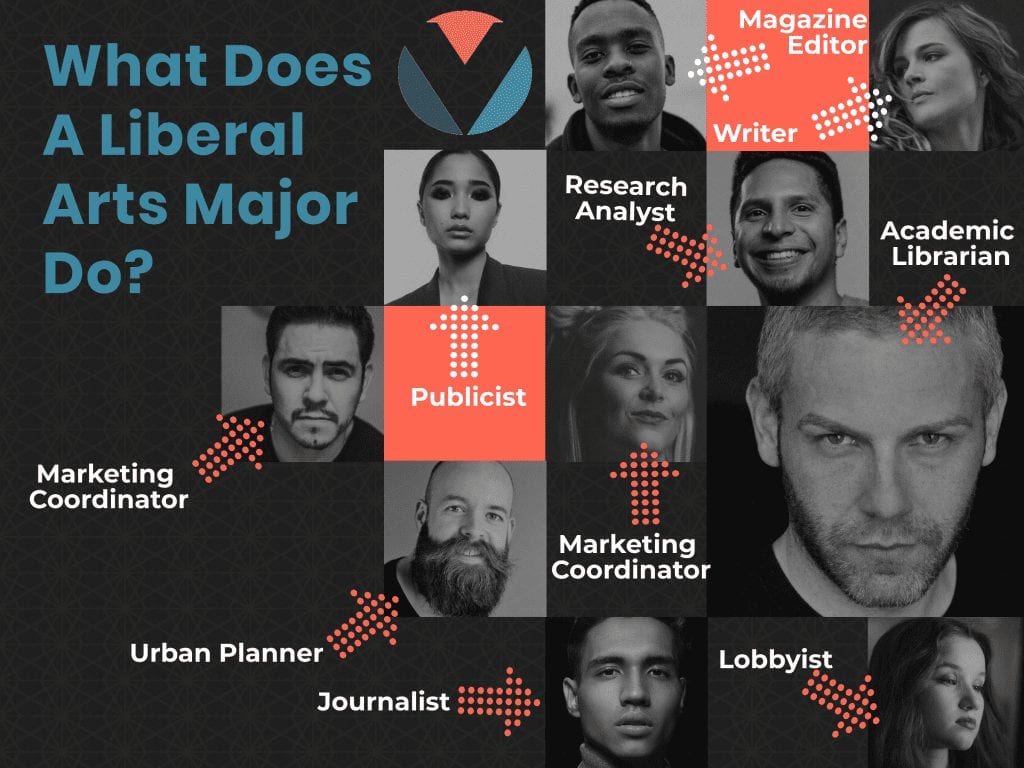
Financing Education
There’s no hiding the fact that college tuition is going up everywhere, from small liberal arts colleges to large public research universities. The starting point for all financial aid is FAFSA, the Free Application for Federal Student Aid. This is how colleges will determine your need, and how the federal government will determine how much grant and loan money you may be entitled to.
After your FAFSA is processed, there are many avenues for financing your education. Federal grants such as the Pell Grant offer students education funding with no strings attached. These are usually need-based. Many undergraduate students choose to participate in the Federal Work-Study program. It grants students money for tuition in exchange for part-time work in the college or university. While they are not free money, they are usually manageable jobs that do not interfere with schoolwork.
Most students end up taking out a student loan. There are generally two types of loans:
- federal loans
- private loans
Federal loans tend to be:
- low-interest
- may be subsidized
- usually have more flexible pay back options than private loans
Private loans:
- are administrated through private banks
- usually have higher interest rates
- can be tougher to pay back
Working professionals who want to increase their credentials with a higher degree should look into tuition reimbursement. Many companies know the value of well-educated employees. They have programs in place to pay part or all of an employee’s college or graduate tuition. Limitations may vary, but generally, the degree has to be specific to the employee’s profession. It may have to be completed at a particular institution or in a set period of time. In other words, if you’re working for a bank, they may help you get a finance degree, but they’re probably not going to pay for your MFA in sculpting.
(Check out: How Can I Get a Tuition Reimbursement From My Employer?)
Don’t forget scholarships! There are literally thousands of them being offered by:
- schools
- private companies
- organizations
- rotary clubs
- churches
They are a gift, meaning they are free. Be sure to look into our Top 50 College Scholarships. These are the best of the best. Check deadlines and apply early.
Career Paths with a Liberal Arts Degree
The liberal arts emphasize transferable, generalist skills. So career paths for liberal arts graduates are varied. Many graduates of general liberal arts undergraduate programs move on to graduate school in a more specific field of studies such as Law or Business. Others take an entrepreneurial route. They use their knowledge to start their own business or service. Graduates in humanities fields such as English, history, and philosophy most often find themselves going into education, usually via graduate school.
Students who are attracted to the liberal arts are often the kind of people who like to chart their own course. The liberal arts gives them the freedom to take that course in a lot of different directions.
(Check out: How to Get the Most Value Out of Your College Experience)
According to Forbes, graduates with liberal arts majors have plenty of job options. The publisher used a special search tool to scour job postings for liberal arts degree jobs, and the results it found were surprising.
Many companies advertise for liberal arts majors. Many more will consider an applicant with any bachelor’s degree. The top liberal arts and humanities jobs Forbes found in their study included positions such as:
- business development manager
- client service specialist
- intelligence analyst
- project manager.
The most common liberal arts degree jobs are jobs that involve writing or politics. Many liberal arts graduates go on to become:
- writers
- editors
- publicists
- lobbyists
- politicians
Some of the best jobs for liberal arts majors are positions which require excellent communication skills. These include:
- city planner
- grant writer
- anchorperson
A liberal arts degree can be a jumping-off point for entry into dozens of different career options. Liberal arts can even be useful in math and science jobs. There is a growing trend of employers in the tech sector seeking out liberal arts majors for their ability to solve complex problems and to adapt to changing work conditions.
Some of the best careers for liberal arts majors are positions most people wouldn’t think of. Portland State University has posted a list of some of the jobs offered to its Arts and Letters graduates. Some of the highlights include:
- web developer
- marketing coordinator
- financial planning assistant
- community support specialist
- volunteer services coordinator
- data processing analyst
- research assistant
- account executive
- correctional officer
- credit manager
- project manager
- news reporter
- deputy sheriff
- senior estimator
- claims representative
- child care supervisor
Liberal Arts Degree Salary
For most people, the value of a liberal arts education can be summed up in one word: salary. Since a liberal arts degree can translate into many different career options, it’s difficult to come up with a single value for the average liberal arts degree jobs salary.
There are is a stereotype of liberal arts majors living with their parents until they are 30. But, really, most liberal arts graduates are better off than they would be if they had not gotten a degree at all. And there are plenty of liberal arts majors that make a good deal of money. Read on for liberal arts degree salary information for some of the most common liberal arts careers.
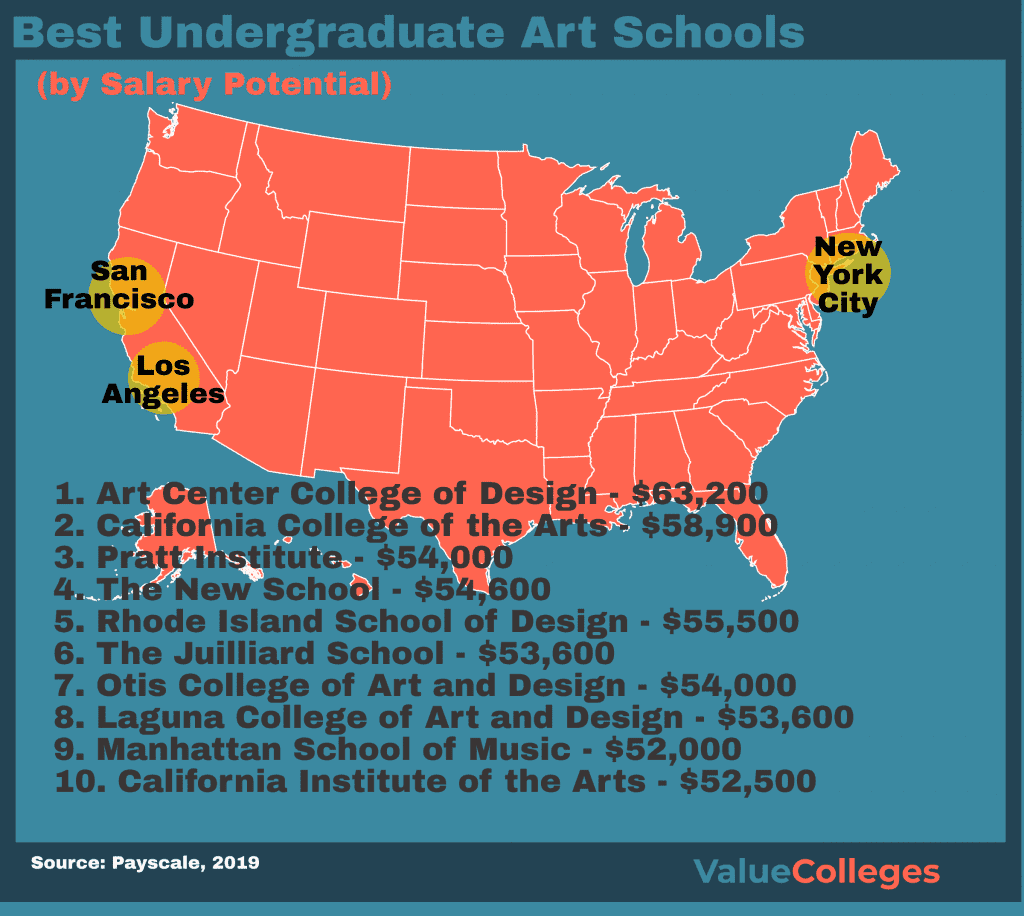
Writers and Authors: There is a strong focus on communication skills—both oral and written—in a liberal arts degree. So it’s no surprise that many liberal arts graduates gravitate toward writing careers. Writers and authors earned a median salary of $62,170 per year in 2020. Unfortunately, there is no growth expected for this career over the next decade.
Reporters, Correspondents, and Broadcast News Analysts: News reporters, correspondents, anchorpeople and others involved in gathering and delivering the news also make good use of the communication skills gained during a liberal arts program. This career is in decline, with a decrease of 10% expected over the next decade. The median pay in 2020 was $43,490 per year.
Editors: Job prospects for editors are expected to fall 3% in the next decade. But editing is a rewarding career for those who enjoy it. This liberal arts job pays a median of $59,480 per year.
Web Developers: Web developers create websites. They are often self-employed. However, many also work for web design or marketing companies. Or they work in-house on a large company’s website. The demand for web developers is expected to grow by about 13% over the next 10 years. The median salary was $69,430 in 2020.
Customer Service Representatives: Customer service representatives:
- answer questions
- take orders
- handle customer requests and complaints
Demand for customer service reps is expected to fall by 2% over the next 10 years. The median pay was $33,750 in 2020.
Social Science Research Assistants: Research assistants help with surveys and laboratory research. They help get the results of the research ready for publication. They assist with data management and quality control. The average salary is $50,420 per year.
Project Managers: Project managers oversee all kinds of projects. They keep work going. They make sure that the project is done on time and stays within the budget. The median income for project managers is around $96,000 per year.
Archivists, Curators, and Museum Workers: Archivists and curators choose and care for artifacts for a museum’s display. They provide restoration services and decide when, where, and how each item will be displayed. This job is expected to grow by 9% over the next decade. The median salary is $48,400 per year.
Policy Analysts: Policy analysts usually work together in groups to try to solve society’s problems. They may work for the government or for a private organization. Policy analysts collect and analyze data, study problems and proposed policies. They make recommendations about them. Government policy analysts can make anywhere from about $93,000 to $145,000 per year.
Social and Community Service Managers: Social and community service managers oversee community organizations and social service programs. They can work for:
- the government
- non-profit organizations,
- businesses.
This career is expected to grow at a rate of 13% within 10 years. The median income is $65,210 per year.
Correctional Officer: Correctional officer is another good option for someone with a liberal arts degree. Correctional officers work in jails or prisons and have high rates of injury and illness. They frequently have to work undesirable days and hours. The demand for this job is expected to fall by about 7% over the next 10 years. The median pay is $44,400 per year.
Urban and Regional Planners: Combined with a liberal arts degree, a master’s in an accredited planning program is usually required to qualify for a position an urban or regional planner. This position makes use of the problem-solving skills acquired in a liberal arts program. Planners determine the best use for land and create plans that help communities thrive. The job outlook is positive, with 11% growth expected over the next 10 years. The median income was $73,050 in 2020.
Loan Officers: Loan officers usually need a bachelor’s degree and some on-the-job training get started. A license is needed to become a mortgage officer. Most loan and mortgage officers are employed by banks and mortgage companies. This is a growing field, with an 8% projected growth rate. The median income is $63,040 per year.
Claims Adjusters, Appraiser, Examiners, and Investigators: Working for insurance companies are:
- Claims adjusters
- examiners
- appraisers
- investigators
They investigate claims that are made against insurance policies issued by the company They decide how much, if any, damages have occurred and need to be paid out. They are often required to travel to assess damages to:
- vehicles
- homes
- other insured property
The job outlook for this career is expected to decrease by 4% over the next 10 years. The median salary is $65,670 per year.
Related Rankings:
- Top 25 Best Value Online Colleges
- Top 25 Lowest Out-of-State Tuition Colleges
- Top 50 Best Value Community Colleges
- Top 50 Best Value Online Graduate Schools
- Essential Guide to Online education in the USA
Featured Programs
Aya Andrews
Editor-in-Chief
Aya Andrews is a passionate educator and mother of two, with a diverse background that has shaped her approach to teaching and learning. Born in Metro Manila, she now calls San Diego home and is proud to be a Filipino-American. Aya earned her Masters degree in Education from San Diego State University, where she focused on developing innovative teaching methods to engage and inspire students.
Prior to her work in education, Aya spent several years as a continuing education consultant for KPMG, where she honed her skills in project management and client relations. She brings this same level of professionalism and expertise to her work as an educator, where she is committed to helping each of her students achieve their full potential.
In addition to her work as an educator, Aya is a devoted mother who is passionate about creating a nurturing and supportive home environment for her children. She is an active member of her community, volunteering her time and resources to support local schools and organizations. Aya is also an avid traveler, and loves to explore new cultures and cuisines with her family.
With a deep commitment to education and a passion for helping others succeed, Aya is a true inspiration to those around her. Her dedication to her craft, her community, and her family is a testament to her unwavering commitment to excellence in all aspects of her life.